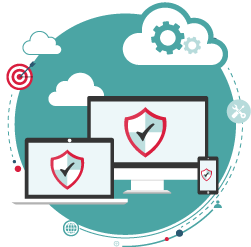In the world today, there are over 3.7 billion Internet users, as compared to over 2 billion in 2010. Over 1 billion people own smart phones. Our media devices and computers are with us constantly; working, reading, taking pictures, keeping us entertained and even transmitting personal information for business and shopping. Knowing there are cameras on most laptops and on your smart phone, imagine there was someone out there who could see what you were doing, or worse, can watch you while you do it. Regrettably, this happens more often than you think … so take a moment to think “Is my life hackable?”.
The outbreak of online fraud and cybercrime saw almost 6 million offences committed last year. Meaning around one in ten adults in the population fell victim to such fraud. Fraud has now become the most prevalent crime in the country with people 10Xs more likely to become a victim than they are to suffer a theft. Unlike many traditional crimes, the victims of cyber offences are drawn from all ages, social backgrounds and countries. Meaning that anyone who uses a computer regularly cannot feel 100% safe.
Top 4 ways you could be affected by Cybercrimes:
Cybercrime covers a wide range of offences including bank and credit card fraud, online shopping rip-offs, hacking and even so-called romance scams. Romance scams are where people pose as someone’s lover online and persuade them into sending them money. In many cases, the scammers are overseas but are easily able to gain access to peoples’ bank accounts remotely. The scam artists con the victim into revealing personal details and passwords. The victims are sometimes not even aware they have been a target until it is too late. They come to realize their savings account has been accessed and drained.
What should you do if you’re a victim of Cybercrime?
Disconnect your computer immediately. Disconnecting your network connection will put a stop to any further damage. If you are uncomfortable doing this, simply disable the network connection. If the crime occurs at work, contact your Technical Support team immediately. They’ll need to know about the infection as soon as possible to prevent any other attacks from occurring. For home users, you may want to contact your service provider for instructions on what to do next.
 Make sure your Anti-Virus program is up to date and scan your computer regularly. Programs with antivirus and antispyware functionality usually detect and may even remove crimeware threats that remain hidden on your machine.
Make sure your Anti-Virus program is up to date and scan your computer regularly. Programs with antivirus and antispyware functionality usually detect and may even remove crimeware threats that remain hidden on your machine.
Some of the worst cases of crimeware are so sophisticated, they will dig deep enough into your systems in an attempt to hide from your security software. Depending on the severity of the attack, you may have to consider going back to square-one by re-installing the operating system of your computer (e.g. Microsoft Windows) or using backup software.

**Very Important** – Regularly back up your critical information as crimeware can lose, steal or destroy your content. This way you have a recent version to revert back to in the event something were to happen. Crimeware may leak your sensitive data; prepare yourself and know the steps to take if this happens to you.
When it comes to online fraud; close any affected accounts immediately. In the best-case scenario, you will be able to shut-down or change any credit card, bank or other online service accounts before the thief can use them again. Make sure you notify your banking Institute as soon as you notice it happens. This will hopefully help to save as much time and energy disputing fraudulent purchases by a cyber criminal later on.
You may even need to file a police report. Ideally, this is done in the area where the crime took place. In the worst case scenario, you may even need to contact government agencies. If your driver’s license or social security number has been stolen, you will need to contact the Department of Motor Vehicles and the Social Security Association respectively.
Is your life hackable?
After reading this article, is your life hackable? As a result, there is actually a 69% chance you have an easily hackable life and will become a victim to Cybercrime at some point in your life. It is extremely important you pay attention to the things you do online and take precautions when opening emails and giving out your personal information.
Check back soon, our next blog post will cover some very important tips on protecting yourself from having a hackable life.

